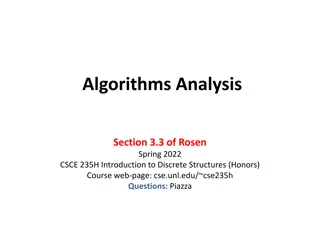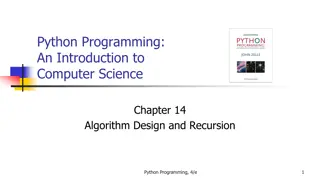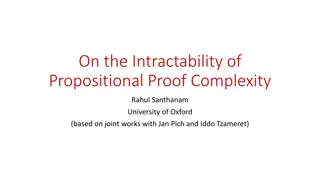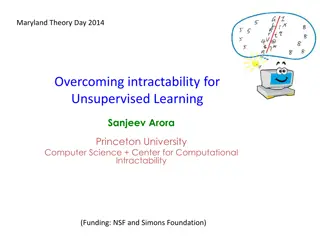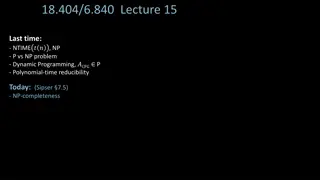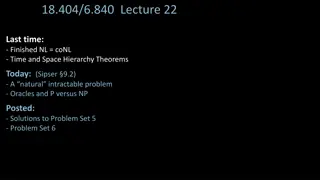Algorithm Analysis: Key Concepts and Methods
Explore algorithm analysis principles including input size characterization, order of growth evaluation, and intractability of problems. Learn how algorithms are compared based on resource utilization and discover the significance of time complexity in algorithm performance assessment.
0 views • 25 slides
Automata Theory and Theory of Computation Overview
This course overview covers concepts in automata theory and theory of computation, including formal language classes, grammars, recognizers, theorems in automata theory, decidability, and intractability of computational problems. The Chomsky hierarchy, interplay between computing components, modern-
1 views • 42 slides
Overview of Stomach Surgery and Treatment Options
The stomach plays a crucial role in digestion and is divided into four regions - cardia, fundus, body, and pyloric part. Understanding the anatomy of the stomach is essential for surgical interventions, including treatment for benign and malignant gastric diseases like peptic ulcer disease. Surgical
1 views • 30 slides
Efficiency and Search Algorithms in Python Programming
This chapter introduces the basics of algorithm efficiency analysis, searching techniques such as linear and binary search, recursive definitions and functions, sorting algorithms like selection sort and merge sort, and the importance of algorithm analysis in determining problem intractability. The
2 views • 134 slides
Propositional Proof Complexity and Lower Bounds
Studies focus on the intractability of propositional proof complexity, exploring the power of proof systems to verify tautologies. Discussion on known lower bounds and challenges in proving hardness of certain tautologies.
1 views • 23 slides
Unsupervised Learning Paradigms and Challenges in Theory
Explore the realm of unsupervised learning as discussed in the Maryland Theory Day 2014 event. Overcoming intractability for unsupervised learning, the distinction between supervised and unsupervised learning, main paradigms, NP-hardness obstacles, and examples like the inverse moment problem are co
0 views • 38 slides
NP-Completeness: Cook-Levin Theorem and Clique Problem
Today's lecture delved into NP-completeness, focusing on the Cook-Levin Theorem and the Clique Problem. NP-completeness is defined as a language that is in NP and all other languages in NP are polynomial-time reducible to it. The Cook-Levin Theorem states that SAT, a Boolean satisfiability problem,
0 views • 10 slides
Hash-Based Signatures
This content discusses the security requirements of hash-based signatures, particularly focusing on XMSS (eXtended Merkle Signature Scheme). It highlights the minimal security requirements of digital signature schemes and the key aspects of XMSS security, such as resistance to chosen message attacks
0 views • 6 slides
Update on Hash-based Signatures and Trapdoor Identification
Explore the latest advancements in hash-based signatures and trapdoor identification schemes, including post-quantum security measures and intractability assumptions. Dive into topics such as Merkle's hash-based signatures and Winternitz-OTS, understanding the functions and generations behind these
0 views • 40 slides
Complexity Classes: Hierarchy Theorems, Exponential Problems, and Intractability
Explore complexity classes, hierarchy theorems, and intractable problems in computational theory. Learn about EXPTIME, EXPSPACE, and their relations to P, NP, and PSPACE. Dive into the intractability of natural problems and understand concepts like regular expressions and EXPSPACE-completeness.
0 views • 12 slides
